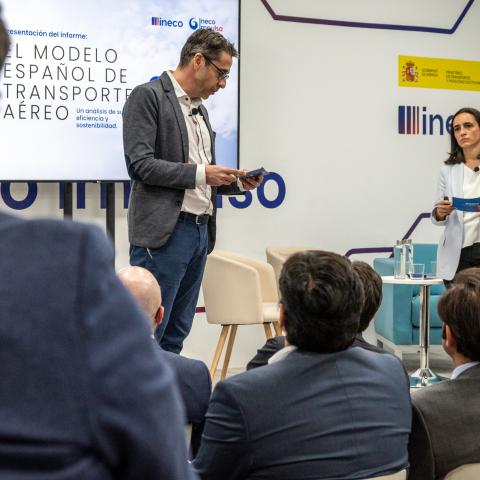
Report presentation
Ineco has presented The Spanish air transport model: an analysis of its efficiency and sustainability report, which confirms Spain as the most solid success story in the European air transport panorama. With more than 309 million passengers and 2.36 million operations in 2024, our country has surpassed pre-pandemic levels and is positioned as the main air market in Europe, ahead of the United Kingdom, Germany, France and Italy. In Spain, transport generates a total economic impact of 156 billion euros (10.8% of GDP) and more than 2 million jobs (9.6% of national employment), making the country a European leader in terms of the sector's economic impact.
The meeting was supported by the Secretary General for Air and Maritime Transport, Benito Núñez, who stressed that "the efficiency and sustainability of the air sector in Spain is fundamental due to the importance of the sector for our economy and the country". He also stressed that "it is worth remembering that in the midst of a scenario in which the rest of our European colleagues are struggling to return to pre-Covid figures, in Spain the sector is growing".
The president of Ineco, Sergio Vázquez Torrón, underlined that "as in the high-speed railway, Spain has built a successful model in the air sector, discreetly and step by step. And that is what we want to highlight, because sometimes as a country it is more difficult for us to recognise our strengths. In the words of Vázquez Torrón "there are many factors that make our air sector unbeatable, from reasons common to the entire infrastructure industry, such as cost efficiency and the ability to meet deadlines, to others linked to the institutional planning framework that has ensured that the development of airport capacity is done with the necessary anticipation of the increase in demand. And, above all, factors of competitive tension, even when operating in a network model, where all agents have the incentives to be more efficient".
Quality and Competitiveness with a Spanish Seal
Spanish airports stand out for their high quality as perceived by users, their punctuality and their competitive airport charges. Barajas and El Prat, for example, are among the major European airports with the lowest passenger charges. This competitiveness also applies to en route charges thanks, among other factors, to the structural reform of air navigation in 2010. Thus, Spanish airports are just below the Eurocontrol average, while the other major countries are all significantly above it in terms of demand volume.
The report also highlights, among the strengths of the sector, the comparatively lower costs of major airport expansions in Spain, compared to similar projects in other European countries. Spanish¬ airports stand out for their efficiency in cost management, managing to maintain future investments at competitive levels without compromising the high capacity targets set. Overall, the planned expansions of the two main Spanish airports (Adolfo Suárez Madrid-Barajas and Josep Tarradellas Barcelona-El Prat) will cost 7 times less than the expansion of London Heathrow, 4 times less than Rome Fiumicino or 2 times less than Amsterdam Schiphol.
A Success Built on Vision and Planning
The report reveals that the sector's good performance is not a matter of chance, but the result of decades of strategic and orderly planning, efficient investments and balanced technical and institutional governance. From the liberalisation of air transport in the 1990s to the consolidation of a network model managed by Aena, Spain has managed to channel a 350 % growth in air traffic, while maintaining high quality standards and competitive costs.
Since the 1990s, Spain has promoted a major expansion of airport infrastructure under a centralised, efficient and ambitious public model.
In the 2000s, these airports consolidated a high-quality, low-cost airline market. From 2010, the focus shifted from construction to management, with the Airport Regulation Document (DORA), the structural reform of air navigation and the entry of private capital into Aena.
This model has proven to be resilient in the face of crises (economic, health), thanks to a solid and adaptable institutional structure, an integrated airport network, and a regulatory framework that promotes efficiency and transparency.
Sustainability and the future: the challenge of decarbonisation
Current success does not guarantee future success. The report identifies sustainability as the major challenge for the coming years. Although domestic air transport accounts for only 1.2% of GHG emissions in Spain, the sector is aware of its key role in the green transition.
In this context, Ineco is developing a pioneering tool that makes it possible to assess emissions comprehensively throughout the life cycle of infrastructure and operations. This approach allows for a more accurate comparison of the impact of different transport modes and guides decisions based on rigorous data.
Spain is well-positioned to spearhead this initiative, boasting a robust aerospace industry, an efficient airport network, and a technological and institutional ecosystem prepared to tackle the future challenges facing the sector.
Access to the full report
Link to the live presentation








